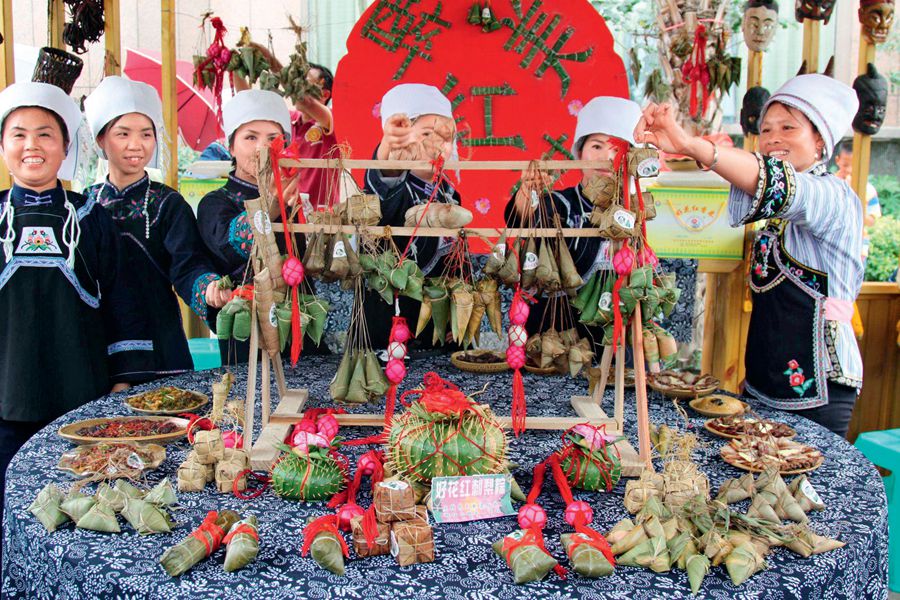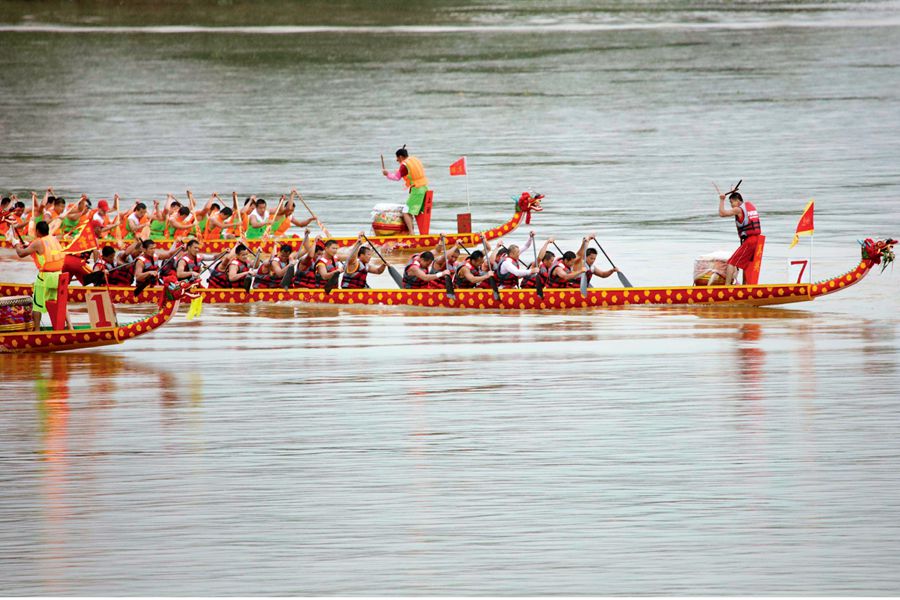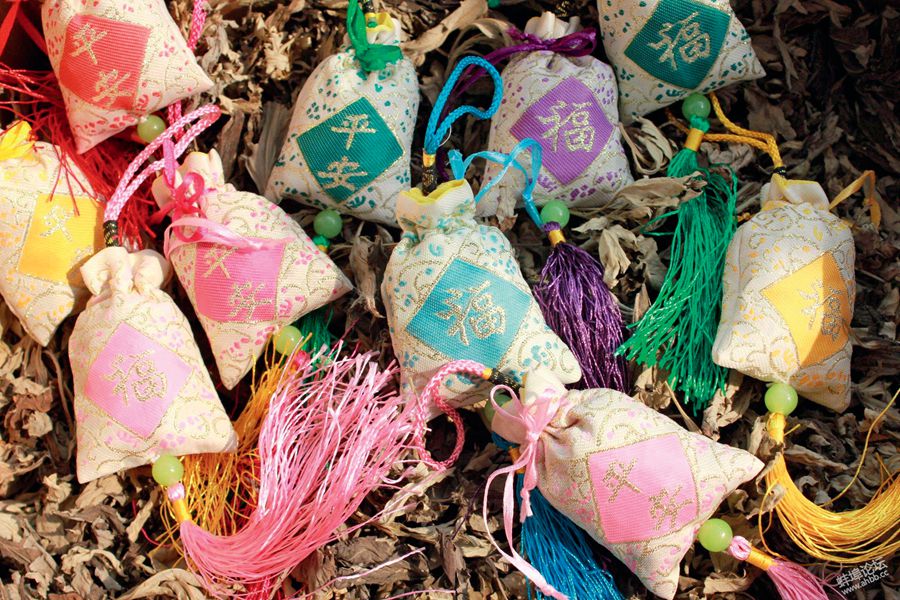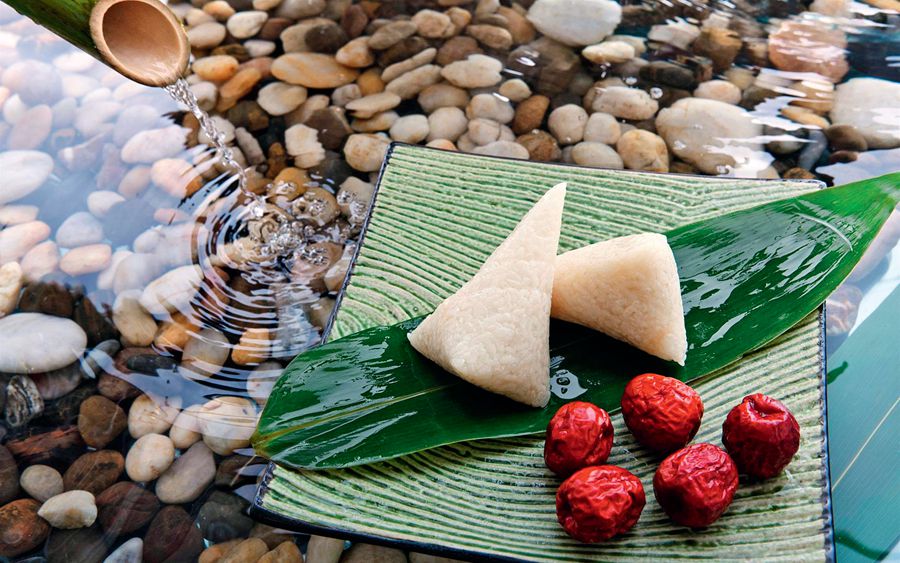THE Dragon Boat Festival is a traditional Chinese festival which originated from the worship of celestial phenomena, and evolved from Dragon totem sacrifice in the remote ages. The festival falls on the fifth day of the fifth lunar month (June 7 on the solar calendar 2019). To celebrate the Dragon Boat Festival, people pray for blessings and protection against calamities with vibrant and colorful festivities. The Dragon Boat Festival began to be observed around the Spring and Autumn Period and the Warring States Period more than 2,000 years ago.
Origin
The Dragon Boat Festival was initially held to offer sacrifices by the ancient Yue tribes (in southern regions in the middle and lower reaches of the Yangtze River) who worshipped dragon totems. As early as the Spring and Autumn Period (770-476 BC), the Yue tribes honored the dragon, which they recognized as their ancestor, by staging dragon boat race on the fifth day of the fifth lunar month. Over the following centuries, most of the Yue people merged into the Han ethnic group, while the rest evolved into various minority groups in the south. As a result, the Dragon Boat Festival has gradually become a festival of the whole Chinese nation.

Celebration of the Dragon Boat Festival.
The Dragon Boat Festival, the Spring Festival, the Qingming Festival, and the Mid-Autumn Festival are known as the four major traditional festivals of China. Since 2008, the Dragon Boat Festival has been listed as a national holiday. In 2009, UNESCO formally approved the inclusion of China’s Dragon Boat Festival into the list of the world’s intangible cultural heritage.
Legends
There are many interesting legends about the Dragon Boat Festival, with the story of “commemorating Qu Yuan” being the most popular one.
Qu Yuan was a minister of the Chu State in the Spring and Autumn Period. He was honest, concerned about his state and the people, and devoted to reform, but certain enemies of his consistently made false allegations against him. The king was easily misled, ignorant of the distinction between loyalty and treachery. Lending a ready ear to slander, the king drove Qu Yuan out of the capital and exiled him to a remote region. On his way to exile, Qu Yuan wrote poems which become popular such as Lisao (The Lament), Tianwen (Heavenly Questions) and Jiuge (Nine Songs), which expressed concerns about the fate of the state.

Dragon Boat Races

Perfume Satchels

Zongzi
Later, the Qin State defeated the Chu State. As the Chu State perished, Qu Yuan, a loyal and patriotic man, was so sad that he decided to end his life. On the fifth day of the fifth lunar month, after writing his masterpiece Embracing Sand, he jumped into the Miluo River (now in Hunan Province) with a stone in his arms, in grief, indignation, and despair.
After Qu Yuan drowned, the people of the State of Chu mourned for him and flocked to the Miluo River to pay tribute to him. The fishermen rowed their boats to try to retrieve his body from the river. This act later became the origin of the annual Dragon Boat Race. One fisherman threw rice balls, eggs, and other food into the river, hoping that the fish, lobster, and crabs, when full, would not damage Qu Yuan’s body. Other people followed suit. An old doctor took a jar of realgar wine and poured it into the river, intending to make dragons intoxicated to the point of losing consciousness so as not to hurt Qu Yuan. Later, for fear that the rice ball would be eaten by dragons, people used leaves of the chinaberry tree to wrap the rice, and bound it up with colored threads. This later developed into zongzi, that is eaten during the festival.
Since then, on the fifth day of the fifth lunar month every year, people hold the dragon boat race, eat zongzi, and drink realgar wine, in memory of the patriotic poet Qu Yuan.
Customs of the Dragon Boat Festival
Dragon Boat Race: It is a traditional Chinese water sport and recreational activity that has been popular for more than 2,000 years. According to historical records, dragon boat races were held in memory of the patriotic poet Qu Yuan. On the day of the Dragon Boat Festival, multiple teams row competing boats, making it a rowing competition. It also spread abroad, garnering much popularity, and evolved into an international competition.
Eating zongzi: On the morning of the Dragon Boat Festival, every household eats zongzi to commemorate Qu Yuan. Generally, people wrap the zongzi the day before, cook it at night, and eat it in the morning. Zongzi is steamed glutinous rice wrapped in leaves and its traditional shape is a triangle, with the taste being sweet or salty.
Hanging Chinese mugwort and calamus: During the Dragon Boat Festival, families sweep the courtyard, insert calamus and moxa sticks in the lintel of a door and hang them in the hall. The stems and leaves of Chinese mugwort contain volatile aromatic oil, and its peculiar aroma can repel mosquitoes. The calamus leaf is straight and long, like a double-edged sword. The ancients believed that it could kill evil spirits, and protect the peace of the house when hanging on the door.
Wearing five-color threads: In traditional Chinese culture, green, red, white, black, and yellow are regarded as auspicious colors. On the Dragon Boat Festival, children wear five-color threads on their wrists to exorcise evil spirits. The five-color threads are not to be arbitrarily broken or discarded, but can only be thrown into the river during the first heavy summer rain or the first bathing of the season in the river. It is said that children wearing five-color threads can avoid snakes, scorpions, and other poisonous insects; throwing them into the river means letting the river wash away plagues and diseases, symbolizing the removal of evil and calamities.
Drinking realgar wine: The custom of drinking realgar wine on the Dragon Boat Festival was extremely popular in the Yangtze River Basin area in the past. Realgar wine is a kind of liquor or yellow rice wine with realgar powder. Realgar can be used as an antidote and insecticide. Ancients believed that realgar could restrain snakes and scorpions and other kinds of insects. On the morning of the Dragon Boat Festival, people also rubbed realgar wine on children’s nostrils and earholes to sterilize the area and avoid insect bites.
Wearing perfumed medicine bags: Children traditionally wore perfumed medicine bags on the Dragon Boat Festival to ward off evil and dispel plagues. The perfumed medicine bags were usually filled with spices and wrapped with five-color threads. They are of various shapes, and linked in a string. Exquisite and charming to look at, the perfumed medicine bags have now become a popular handicraft.
The Dragon Boat Festival Bath: The Dragon Boat Festival is in midsummer, the season of more instances of skin diseases in ancient times. Ancients often decocted cattails, mugworts, and other herbs to bathe. It is said that it could cure skin diseases and remove evil spirits.



